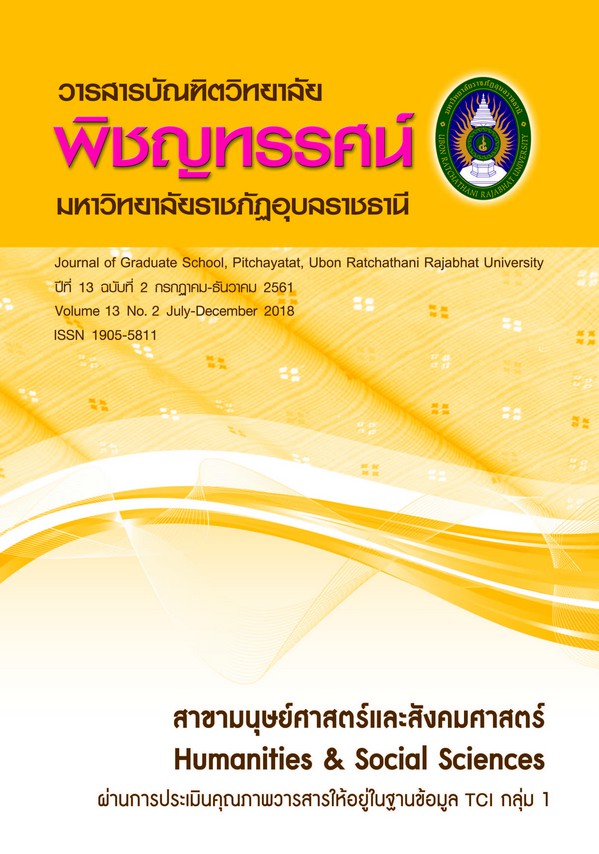วิถีมุสลิมกับความผูกพันต่อหลักศาสนาอิสลามและการบังคับใช้กฎหมายอิสลาม : ชุมชนสวนหลวง 1
คำสำคัญ:
วิถีมุสลิม, หลักศาสนาอิสลาม, กฎหมายอิสลาม, ความผูกพัน, การบังคับใช้กฎหมายบทคัดย่อ
การวิจัยเรื่อง วิถีมุสลิมกับความผูกพันต่อหลักศาสนาอิสลาม และการบังคับใช้กฎหมายอิสลาม : ศึกษากรณีชุมชนสวนหลวง 1 มีวัตถุประสงค์เพื่อศึกษาวิถีมุสลิมในชุมชนสวนหลวง 1 กับความผูกพันต่อหลักศาสนาอิสลาม และการบังคับใช้กฎหมายอิสลาม และศึกษาปัจจัยเชิงเหตุและผลของวิถีมุสลิมในชุมชนสวนหลวง 1 ที่มีอิทธิพลต่อความผูกพันต่อหลักศาสนาอิสลาม และการบังคับใช้กฎหมายอิสลาม โดยเป็นการศึกษาเชิงปริมาณ และเชิงคุณภาพ กลุ่มตัวอย่างเชิงปริมาณ คือ ประชากรในชุมชนสวนหลวง 1 จำนวน 425 ราย ส่วนกลุ่มเป้าหมายที่ให้ข้อมูลเชิงคุณภาพ ได้แก่ กรรมการมัสยิด ได้แก่ อิหม่าม กรรมการบริหารชุมชนสวนหลวง 1 ตัวแทนมุสลิมในชุมชน ปราชญ์ชาวบ้าน และผู้เฒ่าในชุมชน จำนวน 5 ราย ผลการศึกษาพบว่า ชาวมุสลิมในชุมชนสวนหลวง 1 มีหลักความเชื่อเคร่งครัดในเรื่องการศรัทธาในองค์อัลลอฮ์ หรือในคัมภีร์อัลกุรอาน ศาสนาอิสลามจะมีความเคร่งครัดมากกว่าศาสนาอื่น เพราะศาสนาอิสลามจะมีการปลูกฝังกันมาตั้งแต่เด็กในเรื่องของการที่จะปฏิบัติตัวให้ถูกต้อง สำหรับพฤติกรรมของมุสลิมในชุมชนสวนหลวง 1 อยู่ในเกณฑ์ที่เคร่งครัดทั้งในเรื่องของการละหมาด การปฏิญาณตน การถือศีลอด และการปฏิบัติทุกอย่างตามวิถีมุสลิม หลักศาสนาอิสลามช่วยให้มุสลิมมีที่ยึดเหนี่ยว มีการปฏิบัติตามหลักศาสนาอิสลามจนกลายเป็นวิถีชีวิตปกติ หากไม่ปฏิบัติตามหลักศาสนาอิสลามจะส่งผลกระทบต่อชีวิตความเป็นอยู่เพราะองค์อัลเลาะห์วางแนวทางในการดำเนินชีวิตของมนุษย์ในสิ่งที่เป็นประโยชน์ที่มนุษย์ควรจะทำ การดำเนินชีวิตตามวิถีมุสลิมชาวชุมชนสวนหลวง 1 จึงมีอิทธิพลต่อความผูกพันต่อศาสนาอิสลาม และการบังคับใช้กฎหมายอิสลาม ซึ่งวิถีมุสลิมจะส่งผลโดยตรงต่อความผูกพันต่อหลักศาสนามากกว่าการบังคับใช้กฎหมายอิสลามถึง 8 เท่า อย่างมีนัยสำคัญทางสถิติที่ 0.01
เอกสารอ้างอิง
คณะนิติศาสตร์ มหาวิทยาลัยธรรมศาสตร์ ร่วมกับสถาบัน อิสลามและอาหรับศึกษา มหาวิทยาลัยนราธิวาสราชนครินทร์ วิทยาลัยอิสลามศึกษา มหาวิทยาลัยสงขลานครินทร์ วิทยาเขตปัตตานี และคณะ อิสลามศึกษา มหาวิทยาลัยอิสลามยะลา. การปรับใช้กฎหมายอิสลามในประเทศไทย. (ออนไลน์) 2553 (อ้างเมื่อ 3 กรกฎาคม 2557). จาก http://www.coj.go.th/rabi/userfiles/ file/Summary%of%the%seminar%20Criticl%20proposal%20development%20system%20of%20Islamic%20law%20in%20Thailand.doc
ธีรวุฒิ เอกะกุล. ระเบียบวิธีวิจัยทางพฤติกรรมศาสตร์ และสังคมศาสตร์. อุบลราชธานี : สถาบันราชภัฎ อุบลราชธานี, 2543.
นาซีเราะห์ เจะมามะ จิดาภา สุวรรณฤกษ์ อมลวรรณ วีระ ธรรมโม และมุฮำหมัดซากี เจ๊ะหะ. กระบวนการถ่ายทอดการปฏิบติตามหลักคำสอนของศาสนาอิสลามสำหรับเยาวชนในโรงเรียนเอกชนสอนศาสนาอิสลาม 3 จังหวัดชายแดนภาคใต้. วารสาร AL-NUR บัณฑิตวิทยาลัย มหาวิทยาลัยอิสลามยะลา. 6. 11 (2011): 1.
บุญชม ศรีสะอาด. วิธีการทางสถิติสำหรับการวิจัย. พิมพ์ครั้งที่ 2. กรุงเทพฯ: สุวีริยาสาส์น, 2542.
ประพัฒน์ วรกาญจน์. (13 พฤษภาคม 2557). สัมภาษณ์. อิหม่าม. มัสยิดอัลอะติ๊ก.
ปาณฑรา มีนะกนิษฐ. ชาวไทยมุสลิม: วิถีชีวิตและโลกทัศน์การพัฒนาคุณภาพชีวิต กรณีศึกษาชุมชนลำสนุ่นตําบลคลองสอง อําเภอคลองหลวง จังหวัดปทุมธานี. วิทยานิพนธ์ปริญญาศิลปศาสตรมหาบัณฑิต มหาวิทยาลัยมหิดล, 2551.
แพร ศิริศักดิ์ดำเกิง. โครงการทบทวนองค์ความรู้เกี่ยวกับจังหวัดชายแดนใต้ท่ามกลางสถานการณ์ความรุนแรง (2547-2550). กรุงเทพฯ: ศูนย์ข่าวสารสันติภาพ คณะรัฐศาสต มหาวิทยาลัยธรรมศาสตร์, 2552
ฟาฏินา วงศ์เลขา. อิสลามศึกษา วิถีชีวิตที่มุสลิมทุกคนต้องเรียนรู้. (ออนไลน์) 2554 (อ้างเมื่อ 25 มิถุนายน 2555). จาก http://social.obec.go.th/node/100
.............. วิถีมุสลิมกับการเรียนรู้ตลอดชีวิต. (ออนไลน์) 2555 (อ้างเมื่อ 25 มิถุนายน 2555). จาก https://sites.google.com/site/krumouymp/article/withichiwitmuslimkabkarreiynrutlxdchiwit
ระพีพรรณ มูฮัมหมัด. อิสลามกับการพัฒนาอย่างยั่งยืน: กรณีศึกษาชุมชนมัสยิดกมาลุลอิสลาม คลอง แสนแสบ กรุงเทพมหานคร. วิทยานิพนธ์วิทยาศาสตรมหาบัณฑิต สถาบันบัณฑิตพัฒนบริหารศาสตร์, 2556.
ศึกษาธิการกระทรวง, กระทรวง. ความสมานฉันท์ระหว่างชาวไทยมุสลิมกับชาวไทย พุทธ เป็นสิ่งที่เป็นไปได้. (ออนไลน์) 2554 (อ้างเมื่อ 31 สิงหาคม 2556). จาก www.bic.moe.go.th
สุชาติ บุญมี. (12 กรกฎาคม 2557). สัมภาษณ์. ประธานชุมชนสวนหลวง 1. ชุมชนสวนหลวง 1.
Lauro, Carlo. & Vinzi, Vincenzo Esposito. Some Contribution of PLS Path Modeling and a System for the European Customer Satisfaction. (Online) 2004 (Cited October 2, 2009.Available from http://www. sis-statistica.it/files/pdf.
ดาวน์โหลด
เผยแพร่แล้ว
รูปแบบการอ้างอิง
ฉบับ
ประเภทบทความ
สัญญาอนุญาต
บทความทุกเรื่องได้รับการตรวจความถูกต้องทางวิชาการโดยผู้ทรงคุณวุฒิภายนอกอย่างน้อย 3 คน ความคิดเห็นในวารสารพิชญทรรศน์เป็นความคิดเห็นของผู้นิพนธ์มิใช่ความคิดเห็นของผู้จัดทำ จึงมิใช่ความรับผิดชอบของวารสารพิชญทรรศน์ และบทความในวารสารพิชญทรรศน์สงวนสิทธิ์ตามกฎหมายไทย การจะนำไปเผยแพร่ต้องได้รับอนุญาตเป็นลายลักษณ์อักษรจากกองบรรณาธิการ





